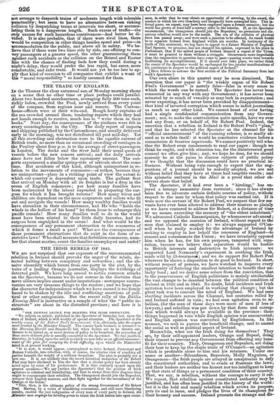THE TRADE OF ENGLAND.
Is the Thames the clear autumnal sun of Monday morning shone on a scene that no other time or place perhaps could parallel. About two hundred merchantmen, averaging fully 300 tons each, richly laden, crowded the Pool, newly arrived from every point of the compass, from regions near and remote. The Custom- house-officers were at their wits-end. Rough hasty captains of the sea crowded around them, tendering reports which they had not hands enough to receive, much less to "write them in their books." Next day, the consequences of the plethora were felt in every countinghouse in the City. The daily report of imports and shipping published by the Customhouse, and usually- delivered early in the morning., was not distributed till past mid-day. Yet all this crowding and obstruction were to the equable current of British trade, no more than an occasional crowding of carriages in the Poultry about four p.m. is to the average of street-passengers in London. The docks and the river held their usual quota of vessels before the new corners arrived ; and the daily arrivals mince have not fallen below the customary amount. The out- ports experienced a similar spring-tide of arrivals about the same time. But accidents of this kind, although unimportant in re- lation to the movements of commerce—or rather, because they are unimportant—place in a striking point of view the extent to which our country is dependent upon trade. The gallant fleet that arrived on Monday with all its freights is but a drop in the ocean of English commerce ; yet how many families have been maintained by the labour expended in preparing the car- goes for which it has brought returns! How many wives and children are dependent on the mere carpenters and sailors who fit out and navigate the vessels 1 How many wealthy families would have shrunken in their circumstances, had He who "holds the winds in the hollow of his hand" let them loose to submerge this pacific armada! How many families well to do in the world must have been stinted in their little daily luxuries, had its cargoes been engnlphed in the ocean! And what would be the consequences of any permanent obstruction to the commerce of which it forms a small a part! What are the consequences of those permanent obstructions that do exist in the form of re- strictive laws? Who shall measure that forbidden commerce, num- ber that absent marine, count the families unemployed and unfed?


































 Previous page
Previous page